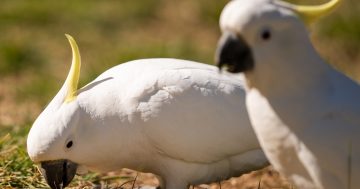
So the Australian National Dictionary Centre (ANDC) are looking to crown Australia’s “word of the year” and would like suggestions to help them along the way. It’s not a vote as they will make the final call, but they’re looking for you to make the shortlist.
I discovered this fact because the ANU have written a story about how ‘twerk’ should be the word of the year.
So many emotions right now.
Why ANU? You do understand that by writing a story about this you are making it more likely to happen!
Yes I realise that by me writing this response I am also helping but… shut up.
Twerk for word of the year? We have so many wonderful words out there! Why? Why would we grant that title to a ridiculous word used to describe a ridiculous dance employed during a tween celebrity’s (admittedly brilliant) performance as a crazed sex goblin that happened too long ago to be still amusing or relevant?
Don’t they realise we’re all up in arms about Russell Brand now anyway? Can’t you keep up ANU?
I was excited by the idea of a word of the year at first.
“That sounds fun!” I thought.
Previous words of the year include twitter, NBN, and podcast… scratch that, there’s no fun here.
It’s just a bunch of people jumping on trends after the fact.
Alrighty, looks like twerk would fit this list perfectly.
Ahh well.
Miley Cyrus brought twerking to the international stage and inspired mining billionaire and now politician Clive Palmer to famously twerk while on the election campaign trail.
That’s an incredibly quick international take-up of a word from obscurity into popular parlance.
So could twerking be up for the word of the year accolade?
The Australian National Dictionary Centre (ANDC) is on the hunt for its 2013 word of the year, and is looking for suggestions on which words you think should make the shortlist.
One word will then be crowned the winner based on its prominence in the Australian social and cultural landscape throughout the year.
It doesn’t need to be a newly coined term. The winning word for 2012 was green-on-blue: ‘an attack made on one’s own side by a force regarded as neutral’, significant in the media during 2012 in reference to Australia’s ongoing military involvement in Afghanistan.
Other previous Words of the Year include podcast (2006), GFC (2008), and Twitter (2009), showing that new words and phrases continually enter our vocabulary as our language organically grows and changes.
In this year’s newly released seventh edition of the Australian Pocket Oxford Dictionary many new words have been added under the Oxford seal of approval.
The first edition, published in 1976, is significant as it was the first general reference dictionary to reflect Australian society and culture, says ANDC Director Dr Amanda Laugesen.
“Australian English is subject to external influences, but we continue to see new Australianisms and Australian usages,” she says.
The publication’s editorial team, Dr Laugesen, Mark Gwynn and Julia Robinson are constantly on the lookout for new words entering the Australian lexicon, and ensure that their definitions reflect the Australian context.
In the new edition of the Australian Pocket Oxford Dictionary, the influence of global trends is clear through the addition of words related to the internet, technology, popular culture and politics such as hashtag, sexting, bromance, selfie, fracking and emissions trading, to name a few.
But specific ‘Australianisms’ have also been included like welcome to country, hook turn and NBN.
If you’d like to submit an entry for 2013 Word of the Year, email andc@anu.edu.au, use the ANDC Word Box or tweet to @ozworders















